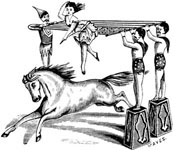
Our Economy of Paper & Hot Air
DISNEY BOSS IS PAID $565 MILLION IN ONE YEAR
I recently read a story about the boss of the Mickey Mouse empire on the business page, headlined “Eisner’s Big Payday: $565 Million.” This was heralded as “the single biggest payday in history,” even as similarly outrageous yearly payouts to CEOs have become routine. I confess that when I read the story, an impertinent question raced through my mind: Where are the socialists now that we need them? Well, I don’t know where they vanished to, but I do know for sure that we don’t need socialism or the socialists. But let me explain why that question pops up.
Capitalism has now been resuscitated following what turns out to have been a premature burial. The morticians included the New Dealers, who used the governmental lash to drive out some of the more blatant abuses in banking and business. They also included labor leaders who, benefiting from the legislation of that period, were able to make their unions bigger and stronger than ever before. Then, in a typical swing of the historical pendulum, government was declared by a succession of administrations to be the enemy of the people. Now, profit without limit and without social responsibility is regnant once again. Organized labor has been de-clawed and reduced to its pre-1930s level of impotence. American workers are once again cringing before their employers in the face of layoffs, downsizing, takeovers, and the widespread export of jobs to places where cheap labor — sometimes virtual slave labor — is available.
What is more, the federal income tax rate is down to where the wealthy feel reasonably comfortable (though they would prefer, and they argue loudly for, the kinds of taxes that bear down more heavily on the poor and middle classes). It is not surprising therefore that, according to recent figures released by the Federal Reserve System, the richest 10 percent of Americans now hold more than two-thirds of our total wealth. During the past 12 years this group harvested 70 percent of the gain in total wealth.
Resemblances to the Harding-Coolidge-Hoover era leading up to the Great Depression are scary. Profits are high (bank profits exorbitantly so); productivity is up; wages are depressed; all of which factors combine to drive up a stock market that has reached unprecedented heights over the past decade. Also, unemployment appears to be low, just as it was before the Crash of 1929. I say “appears to be,” because many employers are now able to get two workers for the price of one. It has become common for the workingman and his wife to leave home for work each day to earn a combined amount that may barely approximate a family living wage. In fact, if their youngsters are of high school age, they too probably find work in our child-labor-driven fast-food industry or in some supermarket. By such standards, our unemployment is indeed low, as it was falsely low in the planned economy of the old Soviet Union, where, as some wag once remarked, “We pretend to work, and they pretend to pay us.” Finally, inflation has quieted down, just as in the late 1920s.
You May Also Enjoy
It is in the economic and political interests of the U.S. to ensure the world’s common language is English, and common standards are American.
In both Habits of the Heart and The Good Society, my co-authors and I have…
One of Vatican II's major problems was that its message of altruistic love and spiritual freedom was given to a society on the verge of cutting loose most of its social mores.

